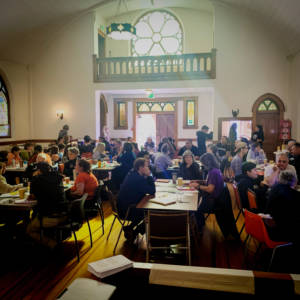On Saturday November 9th, 350 Colorado hosted a Climate Leadership Workshop at Four Winds American Indian Council in Denver in a coalition style event alongside members of Four Winds, Spirit of the Sun, Women from the Mountain, Earth Guardians Boulder, International Indigenous Youth Council and Sunrise Colorado. With over 60 people in attendance for a full day of movement building and learning, it was one of our most successful workshops this year.
Four Winds is located inside a former Lutheran church. For Four Winds American Indian Council however, the church they gather in is no longer a church but a “liberated zone”. The city now known as Denver was actually the original territories of the Arapaho, Cheyenne and Ute Nations before the times of colonization. This liberated zone is a place of Native empowerment and community in Denver. There have been talks about building a new wall on the border of the US and Mexico but walls exist and have existed for generations for native people as Robert Cross an elder explained at the beginning of the workshop. He further explained that until we all acknowledge what happened in our pasts and injustices that happen on a daily basis, we will never begin to heal – that goes for people and the planet.
Grounding efforts of environmental justice in social justice is key to building the 350 movement. To address racial injustice and social injustices we first need to address our implicit biases. If we fail to change those conscious and unconscious thoughts, the roots of oppression will continue to grow. When people begin to address implicit biases within themselves, they are often overcome with guilt. It is okay to feel those feelings but BIPOC (Black/Indigenous/People of Color) communities are not looking for sympathy; they need our empathy, allyship, and action.
Ageism is another wall that we learned to tear down during the workshop thanks to The Sunrise Movement. Liam and Jess pointed out the strengths that each generation has to bring to the table. Older generations have life experience – if we pair that with the bold new visions for the future that young people have, we will be an unstoppable force. We also talked about what we wanted from the other generation; both sides overwhelmingly said respect. This workshop was able to stress the importance of the Jemez Principles for Democratic Organizing without outright saying them. Being inclusive, bottom-up organizing, letting people speak for themselves, working together in solidarity and mutuality, building just relationships, and commitments to self-transformation were all intertwined throughout the day.
The most impactful part of the day was when Shannon Francis from Four Winds American Indian Council and Spirit of the Sun passed around seeds of plants they had grown that year and explained the importance of getting back to working in the soil and decolonizing our food. The growing and harvesting of native seeds is not a peaceful or simple process as one might think. In many places around the world, such as Palestine, it is illegal to have the seeds native to that area. People can be thrown in jail or killed because they are using indigenous seeds. This is why it is so important for the United States to be good ancestors and learn about what actually grew here before 1492. The concept of being a good ancestor is when future generations look back on you, will you have been a good ancestor to them? There is an entire culture of people that have been wiped from history books along with the knowledge they held about the land. Take the bindweed: It is thought of as an invasive species to be ripped out and gotten rid of. However that is the colonizer version of history on this plant. Bindweed is a spider bite medicine and ground cover to ensure crop fields don’t erode over the winter months. This plant along with so many others need their native history and identities restored. Reclaiming land and the native species that grew on it is the most radical thing we can do as a people. So whether you are native to North America or native to Sweden, learning about your food and where it comes from is key to being a good ancestor and in turn key to creating an environmentally just future.
“Coalitions let us stay strong-social justice is a gargantuan issue…
having shoulders to share the load is what keeps us all going.”
-Jenna Lozano, 350 Colorado Intern

